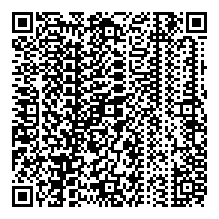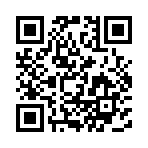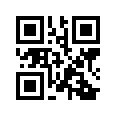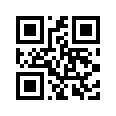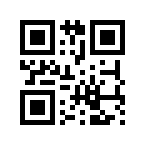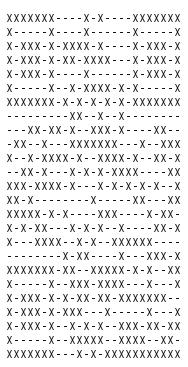The following sections shows a number of example script that can be used as a base for further refinement.
QR Barcode with specified version and stored to a file
Example 27.6. Storing image to a file (qrexample03.php)
1 2 3 4 5 6 7 8 9 10 11 12 13 14 15 16 17 18 19 20 21 22 23 24 25 26 27 | // Example 3 : QR Barcode with specified version and stored to a file // Include the library require_once ('jpgraph/QR/qrencoder.inc.php'); // Data to be encoded $data = '01234567'; $version = 3; // Use QR version 3 $fileName = 'qrexample03.png'; // Create a new instance of the encoder and let the library // decide a suitable error level $encoder = new QREncoder($version); // Use the image backend $backend = QRCodeBackendFactory::Create($encoder, BACKEND_IMAGE); // Set the module size (quite big) $backend->SetModuleWidth(5); // Store the barcode in the specifed file $backend->Stroke($data,$fileName); list($version,$errorcorrection) = $backend->GetQRInfo(); echo "QR Barcode, (<b>Version: $version-$errorcorrection</b>), image stored in file $fileName"; |
QR Barcode with specified version and error correction level
Example 27.7. Specified error correction level (qrexample04.php)
1 2 3 4 5 6 7 8 9 10 11 12 13 14 15 16 17 18 19 20 21 22 23 24 | // Example 4 : QR Barcode with specified version and error correction level // Include the library require_once ('jpgraph/QR/qrencoder.inc.php'); // Data to be encoded $data = '01234567'; $version = 12; // Use QR version 4 $corrlevel = QRCapacity::ErrH ; // Level H error correction (the highest possible) // Create a new instance of the encoder using the specified // QR version and error correction $encoder = new QREncoder($version,$corrlevel); // Use the image backend $backend = QRCodeBackendFactory::Create($encoder, BACKEND_IMAGE); // Set the module size $backend->SetModuleWidth(3); // Store the barcode in the specifed file $backend->Stroke($data); |
QR Barcode with manually specified encodation
Example 27.8. QR Barcode with manually specified encodation (qrexample05.php)
1 2 3 4 5 6 7 8 9 10 11 12 13 14 15 16 17 18 19 20 21 22 23 24 25 26 27 28 29 | // Example 5 : QR Barcode with manually specified encodation // Include the library require_once ('jpgraph/QR/qrencoder.inc.php'); // Data to be encoded // We want the data to be encoded using alphanumeric encoding even though // it is only numbers $data = array( array(QREncoder::MODE_ALPHANUM,'01234567') ); $version = 3; // Use QR version 3 $corrlevel = QRCapacity::ErrH ; // Level H error correction (the highest possible) // Create a new instance of the encoder using the specified // QR version and error correction $encoder = new QREncoder($version,$corrlevel); // Use the image backend $backend = QRCodeBackendFactory::Create($encoder, BACKEND_IMAGE); // Set the module size $backend->SetModuleWidth(4); // Store the barcode in the specifed file $backend->Stroke($data); |
QR Barcode with image in JPG format
Example 27.9. QR Barcode with image in JPG format (qrexample06.php)
1 2 3 4 5 6 7 8 9 10 11 12 13 14 15 16 17 18 19 20 21 22 23 24 25 26 | // Example 6 : QR Barcode with image in JPG format // Include the library require_once ('jpgraph/QR/qrencoder.inc.php'); $data = 'ABCDEFGH01234567'; // Data to be encoded $version = -1; // -1 = Let the library decide version (same as default) $corrlevel = -1; // -1 = Let the library decide error correction level (same as default) // Create a new instance of the encoder using the specified // QR version and error correction $encoder = new QREncoder($version,$corrlevel); // Use the image backend $backend=QRCodeBackendFactory::Create($encoder, BACKEND_IMAGE); // Use JPEG format with 80% quality level $backend->SetImgFormat('jpeg',80); // Set the module size $backend->SetModuleWidth(4); // Store the barcode in the specifed file $backend->Stroke($data); |
QR Barcode with multiple manually specified encodation schema.
Note
Normally there would be no need to ever use manually specified encodation)
Example 27.10. multiple manually specified encodation schema. (qrexample07.php)
1 2 3 4 5 6 7 8 9 10 11 12 13 14 15 16 17 18 19 20 21 22 23 24 25 26 | // Example 7 : QR Barcode with multiple manually specified encodation schemas // (Note: Normally there would be no need to ever use manually specified encodation) // Include the library require_once ('jpgraph/QR/qrencoder.inc.php'); // Data to be encoded $data = array( array(QREncoder::MODE_ALPHANUM,'01234567'), array(QREncoder::MODE_NUMERIC,'89012345') ); // Create a new instance of the encoder (automatically determined QR version and // error correction level) $encoder = new QREncoder(); // Use the image backend $backend = QRCodeBackendFactory::Create($encoder, BACKEND_IMAGE); // Set the module size $backend->SetModuleWidth(4); // Store the barcode in the specifed file $backend->Stroke($data); |
QR Barcode with data read from file
Example 27.11. data read from file (qrexample08.php)
1 2 3 4 5 6 7 8 9 10 11 12 13 14 15 16 17 18 19 20 21 22 | // Example 8 : QR Barcode with data read from file // Include the library require_once ('jpgraph/jpgraph.php'); require_once ('jpgraph/QR/qrencoder.inc.php'); $readFromFilename = 'qr-input.txt'; // Create a new instance of the encoder and let the library // decide a suitable QR version and error level $encoder=new QREncoder(); // Use the image backend $backend=QRCodeBackendFactory::Create($encoder, BACKEND_IMAGE); // Set the module size (quite big) $backend->SetModuleWidth(5); // .. send the barcode back to the browser for the data in the file $backend->StrokeFromFile($readFromFilename); |
QR Barcode with data read from file and different colors
Example 27.12. (qrexample09.php)
1 2 3 4 5 6 7 8 9 10 11 12 13 14 15 16 17 18 19 20 21 22 23 24 25 | // Example 9 : QR Barcode with data read from file and different colors // Include the library require_once ('jpgraph/jpgraph.php'); require_once ('jpgraph/QR/qrencoder.inc.php'); $readFromFilename = 'qr-input.txt'; // Create a new instance of the encoder and let the library // decide a suitable QR version and error level $encoder = new QREncoder(); // Use the image backend $backend = QRCodeBackendFactory::Create($encoder, BACKEND_IMAGE); // Set the module size (quite big) $backend->SetModuleWidth(5); // Use blue and white colors instead $backend->SetColor('navy','white'); // .. send the barcode back to the browser for the data in the file $backend->StrokeFromFile($readFromFilename); |
Specified error correction level
Example 27.13. Specified error correction level (qrexample10.php)
1 2 3 4 5 6 7 8 9 10 11 12 13 14 15 16 17 18 19 20 21 22 23 24 25 26 | // Example 10 : Specified error correction level // Include the library require_once ('jpgraph/QR/qrencoder.inc.php'); $data = 'ABCDEFGH01234567'; // Data to be encoded $version = -1; // -1 = Let the library decide version (same as default) $corrlevel = QRCapacity::ErrH; // Error correction level H (Highest possible) // Create a new instance of the encoder using the specified // QR version and error correction $encoder = new QREncoder($version,$corrlevel); // Use the image backend $backend = QRCodeBackendFactory::Create($encoder, BACKEND_IMAGE); // Set the module size $backend->SetModuleWidth(3); // Set color $backend->SetColor('brown','white'); // Store the barcode in the specifed file $backend->Stroke($data); |
Using the ASCII backend
Example 27.14. Using the ASCII backend (qrexample12.php)
1 2 3 4 5 6 7 8 9 10 11 12 13 14 15 16 17 18 19 20 21 22 23 24 25 26 | // Include the library require_once ('jpgraph/QR/qrencoder.inc.php'); // Example 11 : Generate postscript output $data = 'ABCDEFGH01234567'; // Data to be encoded $version = -1; // -1 = Let the library decide version (same as default) $corrlevel = QRCapacity::ErrH; // Error correction level H (Highest possible) $modulewidth = 1; // Create a new instance of the encoder using the specified // QR version and error correction $encoder = new QREncoder($version,$corrlevel); // Use the image backend $backend = QRCodeBackendFactory::Create($encoder, BACKEND_ASCII); // Set the module size $backend->SetModuleWidth($modulewidth); // Store the barcode in the specifed file $ps_str = $backend->Stroke($data); echo '<pre>'.$ps_str.'</pre>'; |
